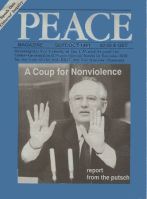
Peace Magazine Sep-Oct 1991, page 14. Some rights reserved.
Search for other articles by Metta Spencer here
PEACE activists sometimes underestimate their own power. Take Alexander Kalinin, the pacifist deputy of the Moscow Soviet who has been campaigning for the right to conscientious objection. In his article, "Soviet Military Doctrine," (PEACE, May 1991) he noted that the radical anti-militaristic groups in the democratic movement are marginalized. In a workshop at the European Nuclear Disarmament (END) conference in Moscow August 13-17, Kalinin deplored that, although Boris Yeltsin favored alternative service to military conscription, this is not likely soon to be established as a human right in the Soviet Union. Indeed, Kalinin doubted that public opinion included ideas about nonviolent resistance.
He was not alone in this belief. Polls show that young people and city people favor democracy, but that the majority elsewhere are willing to pay dearly for order. In a small Ukrainian town, an electrician had told me that, as a Westerner, I must be glad to see his country so weakened.
"Everywhere the shops are empty and people are turning to crime," he said. "I wish we had a strong man in power-someone who would put a stop to this. And ninety-five percent of other people agree with me."
Not ninety-five percent, I felt sure. But how many?
THROUGHOUT MY five-week visit in July and August to activists in Russia and Ukraine it had seemed to me that, contrary to all pessimistic views, militarism is being replaced in surprising places with wonderful, alternative ways of waging conflict. Even some nationalists have been using nonviolent methods. The Lithuanian parliament, for example, has decided to defend their country by such means if it comes to that. Likewise, the Ukrainian separatist movement, Rukh, staged a nonviolent protest last summer in Kiev that forced the Republic's Prime Minister to resign and exacted a pledge that the Chernobyl reactors be phased out. Throughout the END Convention it became clear that nonviolence, not nuclear disarmament, is the chief issue for the Soviet peace movement today. The opposition to conscription is led by civilians, including the Transnational Radical Party's Alexander Kalinin (with his petition for the rights of conscientious objection), Civic Peace Coalition, "Memorial," and "Mothers of Soldiers."
Memorial is a huge organization, composed mainly of older people dedicated to ensuring that Stalin's 40 million victims (including over 20 million deaths) are not forgotten, and that totalitarianism never returns. They endorse the Kalinin petition.
Mothers of Soldiers is the most vocal group supporting the conscientious objection petition. At every workshop in the END Convention one of the mothers gave an emotional speech. Kalinin told me quietly that it is hard to work with them. Especially those whose sons have died are angry and aggressive, and sometimes have to be restrained from physically attacking military officers.
Public opinion is on their side-and for obvious, understandable reasons: 6000 young men die in the army every year. Some commit suicide because of the miserable living conditions; some of them are untrained in handling dangerous materials, and some die as a result of homicide. One mother reported that her son had been killed by an angry Warrant Officer for refusing to peel potatoes. Ethnic violence is a major factor; homicides against Slavic soldiers are disproportionate, which is why many republics are demanding that young men be required to serve only in their own national armies. And the young men are refusing to be inducted-not primarily because of ethical or religious objections, but political and practical ones: They refuse to serve in "an army of occupation" riddled by violence, theft of military equipment, drug and alcohol abuse, and even homicide.
Grass-roots resistance against militarism is everywhere. At the Convention Nikolai Khramov, of the Transnational Radical Party, read out the percentages of draftees who had actually turned up for induction as ordered. Those percentages ranged from 8% in Georgia and 16% in Armenia to 81% in Moldova.
AS I HEADED home, Alexander Kalinin and his wife Julia saw me off at the Moscow train station. Before my train reached Poland, the coup had taken place, and I was questioning my own conclusions about the strength of the nonviolent activists I had met. Perhaps people were still ready to accept dictators.
When I reached Canada, however, the army was defecting and the crowds surrounding the Russian Parliament were completely nonviolent. A tank's big gun barrel sprouted a lavender bouquet. Among the faces on my TV screen, I recognized Oleg, a Russian conscientious objector who had recently been released from prison. This was civilian-based defence, all right. But could they win?
E-mail was still coming through our modems. The peace group Golubka ("Dove") in Moscow, had sent news. Yeltsin, they said, had made copies of Gene Sharp's list of 196 means of nonviolent action (see Sharp's two-volume classic, The Politics of Nonviolent Action), which was being distributed to the crowd. They were getting ready!

Peace Magazine Sep-Oct 1991, page 14. Some rights reserved.
Search for other articles by Metta Spencer here